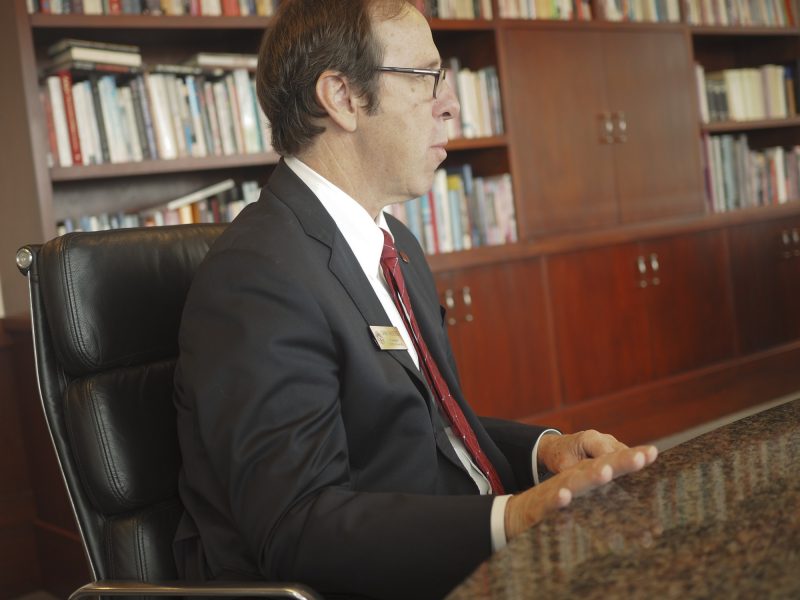Since he took office, Danny Anderson, president of the university, has looked for ways to diversify the Board of Trustees, the 27 people who oversee every aspect of the university, in ethnicity, gender and age. But this diversity does not include appointing students to the board. Anderson stopped Student Government Association’s (SGA) plan to place a student representative on the board due to confidentiality restrictions.
The board, whose members serve 10–20 years on average, handles the university endowment and oversees the long-term policies regarding investment and the future of the university. They review reports from Anderson’s leadership team and make policy suggestions based on these reports, but the leadership team will decide whether to proceed with the suggestions. Additionally, the board manages Trinity’s $1.2 billion endowment.
The SGA Trustee Committee formed two years ago in order to push for student representation that could advocate for student interest on the board of trustees. Benjamin Gonzalez, junior opinion columnist for the Trinitonian and chairman of the SGA Trustee Committee, discussed why Anderson decided against this.
“[Anderson’s] argument was that the board of trustees discusses a lot of confidential things that if there was a student on there might not be allowed to know and might not be allowed to share, so it wouldn’t add to the transparency,” Gonzalez said.
Following this, the committee moved to place a “young alumnus trustee” on the board. This alumnus would be elected at the end of their senior fall semester by the class and would serve a two-year term on the board. Senior Amulya Deva, Student Government Association president, believes this would be beneficial to the student body.
“Essentially, SGA is supposed to advocate for the student body, but we are students. We can tell the administration what we want, but we can only do so much. Having some sort of additional voice that represents students’ interests and our beliefs on a higher level, farther up than the administration, on the board of trustees would be really powerful,” Deva said.
Ultimately, the effort to place a young alumnus on the board was unsuccessful. However, Deva understands the need to diversify in terms of ethnicity and gender before age.
“I spoke with Dr. Anderson about the issue and the reason we’re not pushing this anymore is because Dr. Anderson has a plan on diversifying the Board of Trustees. First, he added in people of color then he was adding in women, his next thing is going to be adding in younger people, but you can’t just add 10 new members to the Board of Trustees — it takes time. I completely agree with the people he’s adding to the board because he’s trying to add a different element of diversity,” Deva said.
Anderson discussed the official role that the board plays.
“The Board of Trustees is a group of individuals who, under Texas law are the individuals responsible for the university. They have the authority to delegate to the president, to the vice presidents and to the faculty the ability to confer degrees to students. They have the responsibility of overseeing the finances of the university to ensure that it perpetuates into the future. They have the responsibility of representing the good of the whole,” Anderson said.
The board oversees Trinity’s entire endowment, aside from the portion allotted to the student management fund, and how it is spent.
“All private schools have endowments and endowments are earning interest and the Board of Trustees has responsibility for watching how those funds are invested and asking ‘Are we getting a good return?’ They are especially interested in inter-generational equity. It means they have an obligation to try to serve students of today to the best of their ability, but also protect that fund so that it will serve the students of tomorrow,” Anderson said.
The board is legally allowed to have up to 36 members. The board’s governance committee, made up of board members, can choose to nominate additional members. When thinking about whether to add new members the board, the board considers the number of upcoming projects they have that need support.
“The board has a governance committee that reviews individuals and decides to make a nomination to the board. Once they’ve made a nomination we work to invite and hopefully secure an acceptance from those individuals. Trustees are also key members who help raise funds for scholarships, for new buildings, for projects and looking at both the expertise that’s needed for thinking about things happening at the university but also additional support that they could provide,” Anderson said.
The board works with Anderson’s leadership team, made up of vice presidents from across departments, to make policy decisions.
“One of the key decisions that a board makes is to hire a president. Then almost all boards delegate the workings of the university to the president. We operate under a tradition of shared governance in that we work with faculty senate, with faculty and with SGA to try and look and think about different policies, practices, ways to use our funds, our time and our degree programs that would serve the interests of all of that group,” Anderson said.
Anderson believes that the board is able to support Trinity’s best interest.
“There’s a concern that students believe they’d be there to represent a certain point of view. If you accept an appointment as a trustee, you think about the good for the whole. You’re not there to represent a position,” Anderson said.







